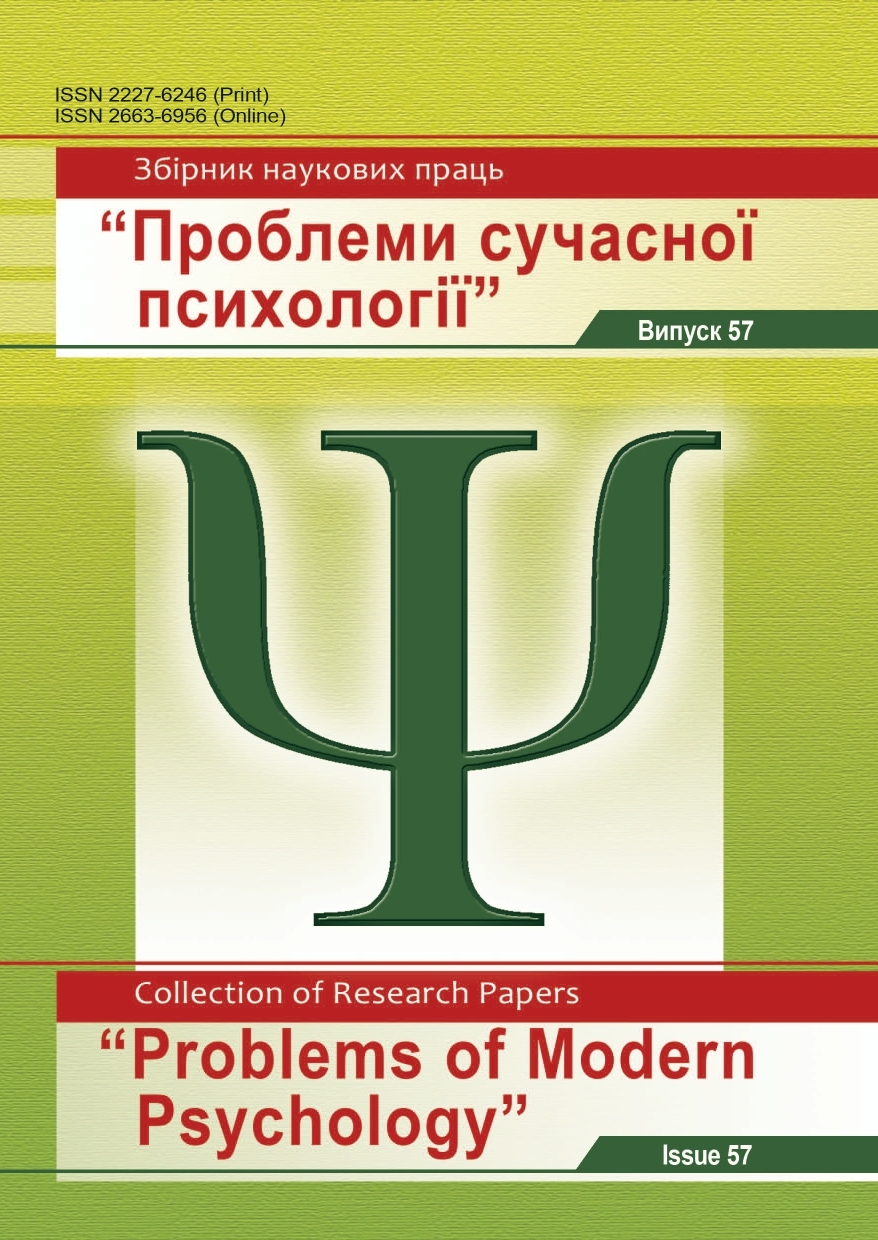The Means of Developing Learner’s Autonomy in the Conditions of Online Studying at Secondary Schools
DOI:
https://doi.org/10.32626/2227-6246.2022-57.51-69Keywords:
learner’s autonomy, online studying, digital technologies, technical internal system, network, verbal-logical thinking, figurative thinking, object-effective thinkingAbstract
The purpose of our article is characterizing the concept of discursive competence according to the means of developing learner’s autonomy in the conditions of online studying at secondary schools.
Methods of the research. The following theoretical methods of the research were used to solve the tasks formulated in the article: the categorical method, structural and functional methods, the methods of the analysis, systematization, modeling, generalization. The ascertaining research was used as an empirical method.
The results of the research. An extensive use of the concept of online studying and the development of its technical internal system capabilities have led to significant changes in the understanding of this term. We define it as a global association of computer networks, an integrated network, web-sites, consisting of different communication networks integrated into a single logical online system. However, this definition no longer covers all aspects of this phenomenon. According to the field of Online Psychology we mean online studying not as a specific network of interconnected computers and mobile devices, or even a network of web-sites with channels and communication devices between components with appropriate programs and protocols, as networks together with social services based on them, which attract people and / or ensure their activities.
Conclusions. Thus, virtual discourse shapes the linguistic consciousness of a nation, social representations, general opinions, patterns of the person’s behavior, frames and scenarios or even scripts. We have proved that the Internet environment is an effective factor in shaping personal value system. It is focused that digital technologies, for example the Internet, change not only consciousness and behavior, but also their physiological basis of the person, so, the brain.
References
Bates, D., Maechler, M., Bolker, B., & Walker, S. (2014). lme4: Linear mixed-effects models using Eigen and S4. Journal of Package Version, 1(7), 1–23.
Honcharuk, Nataliia, & Onufriieva, Liana (2018). Psykholohichnyi analiz rivniv pobudovy komunikatyvnykh dii [Psychological analysis of the levels of construction of communicative actions]. Psycholinguistics. Psykholinhvistyka. Psikholingvistika – Psycholinguistics. Psycholinguistics. Psycholinguistics, 24(1), 97–117. Retrieved from https://doi.10.31470/2309-1797-2018-24-1-97-117 [in Ukrainian].
Ivashkevych, Ed., & Koval, I. (2020). Psychological Principles of Organization of the Deductive Process at the English Lessons at Secondary Schools. Zbirnyk naukovykh prats «Problemy suchasnoi psykholohii» – Collection of research papers “Problems of modern psychology”, 50, 31-52. Retrieved from https://doi.org/10.32626/2227-6246.2020-50.31-52
Maksymenko, S., Тkach, B., Lytvynchuk, L., & Onufriieva, L. (2019). Neiropsykholinhvistychne doslidzhennia politychnykh hasel iz zovnishnoi reklamy [A neuropsycholinguistic research of political slogans from outdoor advertising]. Psycholinguistics. Psykholinhvistyka. Psikholingvistika – Psycholinguistics. Psycholinguistics. Psycholinguistics, 26(1), 246–264. https://doi.10.31470/2309-1797-2019-26-1-246-264. Retrieved from https://psycholing-journal.com/index.php/journal/article/view/715 [in Ukrainian].
Mykhalchuk, N., & Bihunova, S. (2019). The verbalization of the concept of “fear” in English and Ukrainian phraseological units. Cognitive Studies | Études cognitives, Warsaw (Poland), 11. Retrieved from https://doi.org/10.11649/cs.2043.
Mykhalchuk, N., & Ivashkevych, E. (2019). Psycholinguistic Characteristics of Secondary Predication in Determining the Construction of a Peculiar Picture of the World of a Reader. Psycholinguistics. Психолінгвістика. Психолингвистика – Psycholinguistics. Psycholinguistics. Psycholinguistics, 25(1), 215–231. Retrieved from https://doi.10.31470/2309-1797-2019-25-1-215-231.
Mykhalchuk, N., & Onufriieva, L. (2020). Psychological Analysis of Different Types of Discourse. Zbirnyk naukovykh prats «Problemy suchasnoi psykholohii» – Collection of research papers “Problems of modern psychology”, 50, 188–210. Retrieved from https://doi.org/10.32626/2227-6246.2020-50.188-210.
Onufriieva, L.А. (2020). Rozvytok profesionalizmu maibutnikh fakhivtsiv sotsionomichnykh profesii: sotsialno-psykholohichnyi vymir [The development of the professionalism of future specialists of socionomic professions: socio-psychological aspect]. Kyiv: Publisher Bykhun V.Yu. ISBN 978-617-7699-08-7 [in Ukrainian].
Downloads
Published
How to Cite
Issue
Section
License
Copyright (c) 2022 Ivashkevych Ernest

This work is licensed under a Creative Commons Attribution-NonCommercial 4.0 International License.
Copyright
The Editorial Board has the full right to publish original scientific papers containing results of theoretical and experimental research works which are not currently subject to review for publication in other scientific editions. The Author shall transfer to the editorial board of the Collection the right to spread the electronic version of the paper, as well as the electronic version of the paper translated into English (for papers originally submitted in Ukrainian and Russian) by all kinds of electronic means (placement at the official website of the Collection, electronic databases, repositories etc).
The Author of an article reserves the right to use materials of the paper, without approval with the editorial board and the founders of this Collection: a) partially or fully, for educational purposes; b) for writing own dissertation papers; c) for preparation of abstracts, conference reports and presentations.
The Author of an article can place electronic copies of the paper (including the final electronic version downloaded from the official website of the Collection) at:
- personal web resources of all Authors (websites, webpages, blogs etc.);
- web resources of the institutions where the Authors are employed (including electronic institutional repositories);
- non-profit public access web resources (for example, arXiv.org).
But in all cases, it is obligatory to have a bibliographic reference to the paper, or a hyperlink to its electronic copy placed at the official website of this Collection.






